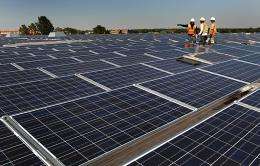'Radical' clean energy shift could save 4 tn euros: WWF

The environmental group WWF argued on Thursday that a radical, near total global shift to clean fuels within 40 years could yield savings of four trillion euros ($5.4 trillion) a year as well as tackle climate change.
"The Energy Report" produced by WWF and consultancy Ecofys seeks to make the case for a concerted move away from high carbon fossil fuels such as oil, coal and gas to 95 percent clean energy by 2050 through "massive" investment.
It said that, although such a shift was "a radical departure from humanity's current course" and ambitious, it was technically feasible as well as unavoidable to cut carbon emissions and tackle global warming.
The report also outlines economic benefits despite the one to 3.5 trillion euro a year investment it advocates over the next quarter of century.
Currently, 80 percent of the world's energy comes from fossil fuels while investment in clean energy worldwide reached 110 billion euros by 2009, according to the report.
"By 2050 we save nearly four trillion euros per year through energy efficiency and reduced fuel costs compared to a 'business-as-usual' scenario," it added.
Despite the huge costs involved in a switch the report claimed the balance could break even by 2040.
The WWF highlighted savings from an end to oil, gas and coal subsidies around the world totalling 500 billion to 800 billion dollars a year depending on crude oil prices, based on recent International Energy Agency (IEA) and OECD estimates.
The report also estimated that the steps would produce a net 15 percent decrease in global energy demand by 2050, even with population growth, industrial expansion and increasingly wealthy populations.
Apart from more commonly advocated massive changes in fuels for transport and power supplies, the report pinpoints a huge range of steps to achieve less energy use affecting different walks of life.
It envisages halving meat consumption in rich countries -- to reduce expanding methane emissions from livestock -- but an increase of a quarter in poor nations, in both instances meeting health and dietary needs as well.
Better insulation, solar power and geothermal pumps for housing and offices are also advocated, including by refitting existing buildings at a rate of two to three percent of existing floor area per year.
Saudi petroleum and energy minister Ali Ibrahim Al-Naimi predicted at a UN forum in Geneva this week that the global energy mix would settle at about 50-50 split between oil and renewables or other sources.
The OPEC stalwart highlighted a near 40 percent growth in overall energy needs over the coming decades predicted by the IEA, typified by the recent surge in demand for oil from emerging nations like China and Brazil.
"The world does not have the luxury of discarding any particular energy source," argued Naimi. He has supported technological measures to reduce pollution and emissions from oil.
(c) 2011 AFP



















